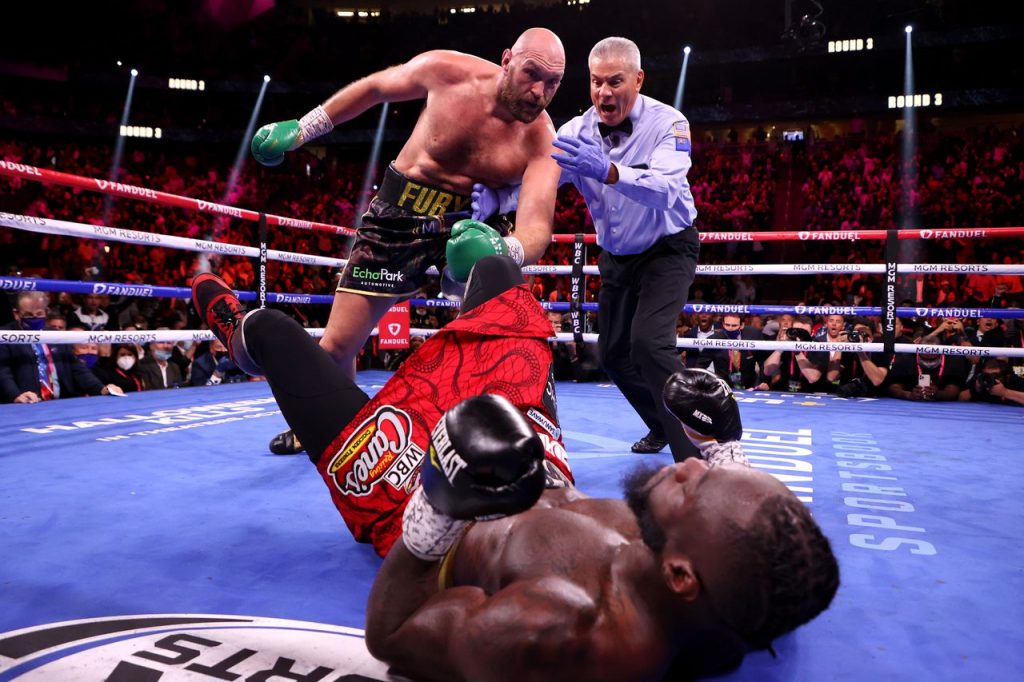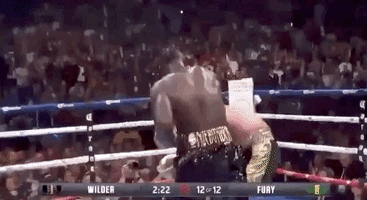
From Good To Great: Tyson Fury And Mental Health
Listen to From Good To Great: Tyson Fury And Mental Health read by me, the author, below!
From the world unified heavyweight champion to a man on the brink of suicide, Tyson Fury and his mental health struggles are well documented. But the conquering of his demons and return to boxing is the making of a movie. But Fury’s overcoming of his mental problems is something more than that. As an athlete it’s a testament to his will and determination as a human.
In my From Good to Great series, I focus on athletes that were amazing early in their careers and changed later on to become even better. We’ve already done From Good To Great: Where Chris Weidman Fell Short As An All Time Great and From Good To Great: Kamaru Usman. Now, we are diving into the world of boxing and talking Tyson Fury.
In the Usman section above, we talked about the UFC champion having to adapt what his body has given him and change to work with what tools he had and anticipate what he wouldn’t have in the future. In the Weidman section, we focused on how he failed to do so. These were both physical problems: Usman and his knees are integral to wrestling and Weidman and his chin to box into grappling exchanges. Tyson Fury has a different kind of problem presented to his body: anxiety and depression.
The One Who Had It All: Tyson Fury
Once upon a time, Tyson Fury was the biggest name in boxing. Brash and bold, Fury went into the heavyweight fight with Wladimir Klitschko, who’s reign over the heavyweight division made the general population forget about heavyweight boxing, looking to change the status quo. Fury did, even if the fight was uneventful. But, The Gypsy King had climbed Everest, gave the entire world the bird, and was on top of the boxing world. He was the heavyweight champion.
Tyson Fury was now plagued with a problem that many notable figures in history have struggled with. From athletes to rockstars to inventors and more, once getting to the top they all have one question: now what?
Tyson Fury’s struggle wasn’t knees going out or boxing passing him up, it was mental. Fury was dealt a hand that despite all of the great things he’s accomplished, it wasn’t enough and there was always a high he was chasing. After becoming the champion, he chased that high with drugs, running away from his depression in the most destructive of ways.
You’ve seen the comparison pictures and heard the stories on Fury. He ballooned over 400 pounds and thought about suicide often. While there’s no need to retread that oft repeated story, lyrics from Hurt by Nine Inch Nails do come to mind when thinking about his struggle with mental health.
You could have it all
My empire of dirt
I will let you down
I will make you hurtHurt – Nine Inch Nails
Tyson Fury, however, decided to be great. He found his motivation again. His comeback was exemplified with his rise through boxing again and perhaps the drama at it’s highest in the 12th round against Deontay Wilder. This time, he is staying at the top.
Fury made his intentions of his comeback clear: he wanted Deontay Wilder. Did he see the undefeated Wilder as a manifestation of his demons? Was he simply the biggest and most dangerous man? Only Fury could tell us that and perhaps he will someday. But for now, it’s all speculation.
Fury’s get up from the clean two punches from Wilder will live on in history. But perhaps the get up is a personification of what let Tyson Fury survive.
I know I said I wasn’t going to retread the suicide story Fury has given on The Joe Rogan Experience and other places, but I think it’s more necessary here. Let’s paint the two portraits and see how they coalesce.
Tyson Fury is driving down the road, ready to end his life. He is up to 190 miles an hour in his Ferrari and is approaching a bridge rapidly. In his comeback to boxing, Fury is taking on Deontay Wilder too soon according to many pundits. He was heading to a one man car crash straight for a bridge.

In the fight, Fury fought cautious and was knocked down once in the ninth. Then, everything came to a head in round 12. Wilder caught Fury seemingly knocking him out. It was the moment of truth for Fury. Much like him heading toward the bridge at 190 miles an hour, it seemed like the end for Fury. But just like the last minute turn that saved his life, Fury rose up from ashes not to be done in that easy.
Much like his return to boxing, that 12th round which saw a renewed Tyson Fury coming forward showing the guts, grit and determination to come forward in the face of defeat and won the rest of the round, much like Fury’s even more broad return to boxing and toppling Deontay Wilder.
Tyson Fury’s specific struggle wasn’t with a body that gave up on him in the traditional sense we think of when athletes lose the edge. Fury wasn’t getting slower or more injury prone. Fury’s struggle was within himself, within his mind. He battled a disease so many struggle with every day. Fury’s struggle with depression, drug abuse, and more just prove that even the heavyweight champion of the world, the man who ended the Klitschko era, isn’t immune to mental health problems. He, like you and I, is a person just the same as anyone else on this planet.
Where does Fury go from here?
Fury’s battle with depression isn’t something that he can fix. It’s not like Usman’s knees where he can just learn to strike. It isn’t like Ali changing his fighting style to something more cerebral after he returned from his exile. Fury can’t fix this with a gameplan adjustment. It’s a lifestyle adjustment.
Fury is incredibly vocal about his struggles with mental health, drug addiction, and more. It’s what he has made this whole comeback about. “I’d like to thank my Lord and Savior, Jesus Christ,” says Fury after every fight. He speaks out, the best heavyweight champion in the world, talking about his self doubt, his depression, and life struggles.
Tyson Fury once put his self worth in what he accomplished in boxing. Once he took home the most coveted title in all of boxing, the unified world heavyweight championship, the victory seemed hollow. Now, Fury very obviously does not put his worth in what he does in boxing. His life is more balanced. This has allowed Fury to have his popularity reach entirely new heights. And with that new found popularity, his word on mental health is spread farther. More journalists, like myself, write on his struggles. More people read. More people are less scared to ask for help. If the two time heavyweight champion, one of the toughest men in the world, can be vulnerable for just one moment and seek out the mental health he needs, the average man or woman can as well.
Tyson Fury may have done incredible things in boxing. There may be even higher mountains that Fury can conquest. But Tyson Fury’s real adjustment as an athlete will be what he can do outside of boxing. Much like Muhammad Ali and many others before him, what Fury does outside of the ring will be bigger and more important than what he did in the ring.
If you are someone else is suffering from mental health crisis, call the Suicide Prevention Hotline at 1-800-273-TALK (8255). Reach out and talk to someone. You are worth it.
